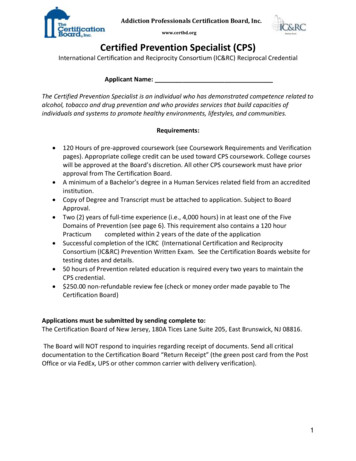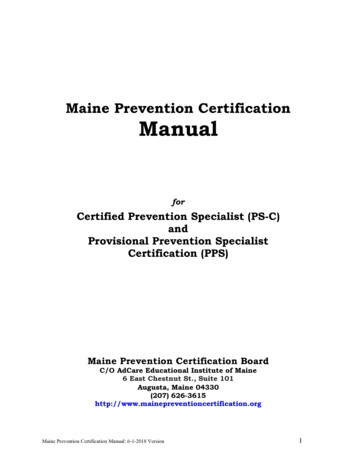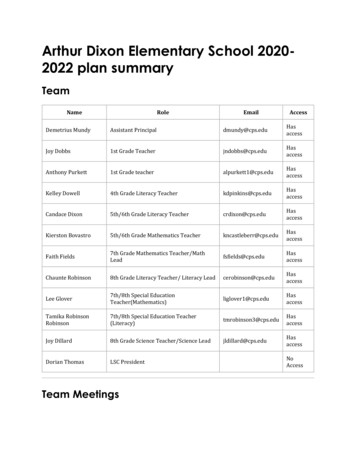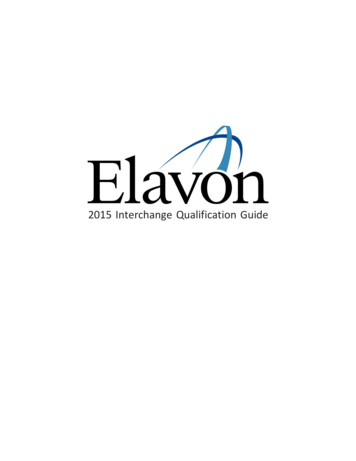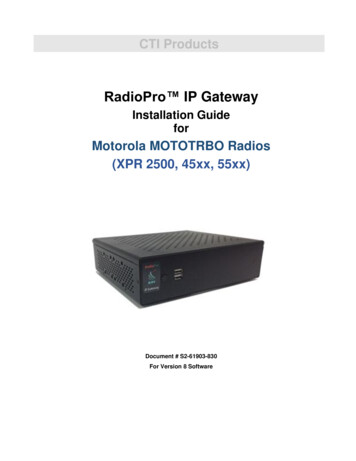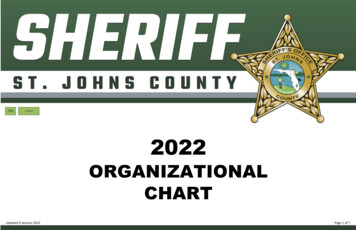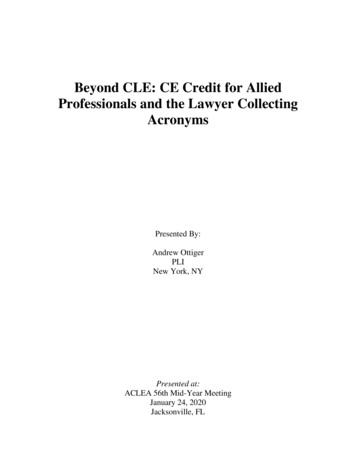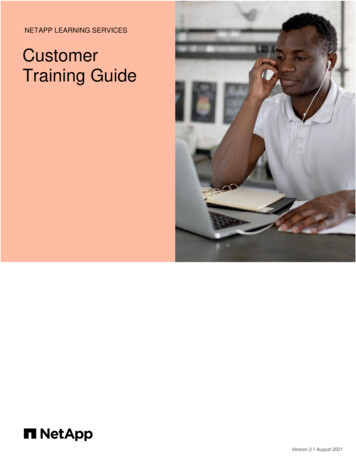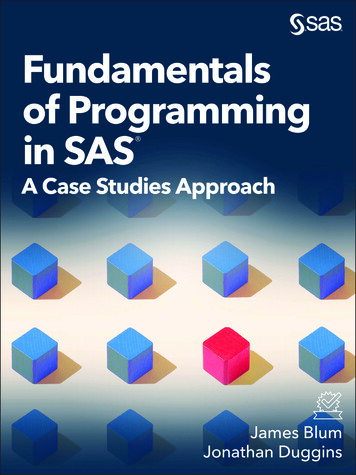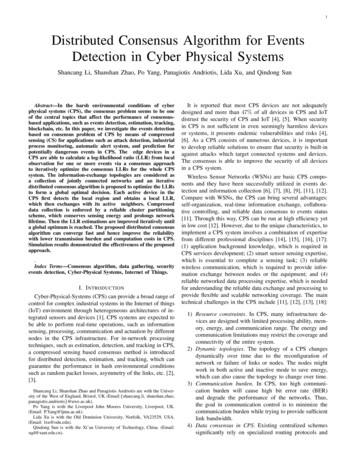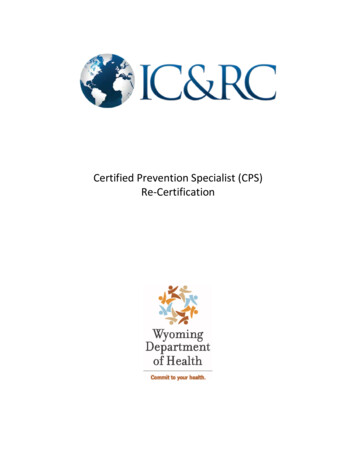
Transcription
Certified Prevention Specialist (CPS)Re-Certification
TABLE OF CONTENTSDirections/Checklist3Prevention Specialist Domains4Recertification6Application7Code of Ethical Conduct8Certified Prevention Specialist Re-Certification 2
DIRECTIONS/CHECKLISTCertificates of attendance for trainings and continued education.Current job description signed and dated by applicant and supervisor (if applicable).Signed and dated Code of Ethical Conduct.Fee of 35.00 which may be paid by check/money order (payable to Wyoming Department of Health). Feemust include the applicant’s name.Applicants can mail completed application, copies of certificates of attendance, attachments, and fee to:Wyoming Department of HealthAttn: Substance Abuse Prevention ProgramWyoming Certification Board6101 Yellowstone Road, Suite 510Cheyenne, WY 82002Any questions about the application process can be directed to Missie Payne by email at melissa.payne1@wyo.gov withsubject line “IC&RC Prevention Specialist Re-Certification” or by phone at (307) 777-5017.Certified Prevention Specialist Re-Certification 3
PREVENTION SPECIALIST (PS) DOMAINSDomain 1: Planning and 7.18.19.20.Determine the level of community readiness for change.Identify appropriate methods to gather relevant data for prevention planning.Identify existing resources available to address the community needs.Identify gaps in resources based on the assessment of community conditions.Identify the target audience.Identify factors that place persons in the target audience at greater risk for the identified problem.Identify factors that provide protection or resilience for the target audience.Determine priorities based on comprehensive community assessment.Develop a prevention plan based on research and theory that addresses community needs and desiredoutcomes.Select prevention strategies, programs, and best practices to meet the identified needs of thecommunity.Implement a strategic planning process that results in the development and implementation of a qualitystrategic plan.Identify appropriate prevention program evaluation strategies.Administer surveys/pre/post-tests at work plan activities.Conduct evaluation activities to document program fidelity.Collect evaluation documentation for process and outcome measures.Evaluate activities and identify opportunities to improve outcomes.Utilize evaluation to enhance sustainability of prevention activities.Provide applicable workgroups with prevention information and other support to meet preventionoutcomes.Incorporate cultural responsiveness into all planning and evaluation activities.Prepare and maintain reports, records, and documents pertaining to funding sources.Domain 2: Prevention Education and Service Delivery1.2.3.4.5.Coordinate prevention activities.Implement prevention education and activities appropriate for the target audience.Provide prevention education and programs that are relevant and timely for community conditions.Maintain program fidelity when implementing evidence-based practices.Serve as a resource to community members and organizations regarding prevention strategies and bestpractices.Domain 3: Communication1. Promote programs, services, and activities, and maintain good public relations.2. Participate in public awareness campaigns and projects relating to health promotion across thecontinuum of care.3. Identify marketing techniques for prevention programs.4. Apply principles of effective listening.5. Apply principles of public speaking.6. Employ effective facilitation skills.Certified Prevention Specialist Re-Certification 4
7. Communicate effectively with various audiences.8. Demonstrate interpersonal communication competency.Domain 4: Community Organization1. Identify the community demographics and norms.2. Identify a diverse group of stakeholders to include in prevention programming activities.3. Build community ownership of prevention programs by collaborating with stakeholders when planning,implementing, and evaluating prevention activities.4. Offer guidance to stakeholders and community members in mobilizing for community change.5. Participate in creating and sustaining community-based coalitions.6. Develop, or assist in developing, content and materials for meetings and other related activities.7. Develop strategic alliances with other service providers within the community.8. Develop collaborative agreements with other service providers within the community.9. Participate in behavioral health planning and activities.Domain 5: Public Policy and Environmental Change1.2.3.4.5.6.Provide resources, training, and consultation that promote environmental change.Participate in enforcement initiatives to affect environmental change.Participate in public policy development to affect environmental change.Use media strategies to support policy change efforts in the community.Collaborate with various community groups to develop and strengthen effective policy.Advocate to bring about policy and/or environmental change.Domain 6: Professional Growth and Responsibility1.2.3.4.5.6.7.8.9.10.Demonstrate knowledge of current prevention theory and practice.Adhere to all legal, professional, and ethical principles.Demonstrate cultural responsiveness as a prevention professional.Demonstrate self-care consistent with prevention messages.Recognize importance of participation in professional associations locally, statewide, and nationally.Demonstrate responsible and ethical use of public and private funds.Advocate for health promotion across the life span.Advocate for healthy and safe communities.Demonstrate knowledge of current issues of addictionDemonstrate knowledge of current issues of mental, emotional, and behavioral healthCertified Prevention Specialist Re-Certification 5
RECERTIFICATIONTo maintain the high standards of this professional practice and to assure continuing awareness of new knowledge in thefield, WDH requires recertification every two years.To be recertified as a CPS, an individual must:1. Hold a current and valid certificate issued by WDH;2. Acquire 40 hours of WDH-approved education relevant to domains identified including three hours inprofessional ethics and responsibilities received within the two-year recertification cycle. Professionalsrecertifying their credential(s) may be subject to an audit. Review the recertification application for moredetails;3. Verify that you have reviewed, read, and will uphold by practice the WDH Code of Ethical Conduct forprofessional behavior; and4. Complete an application and pay the recertification fee of 35.LAPSED CERTIFICATIONThe completed recertification application should be received at WDH prior to the expiration date. If the application isincomplete, applicant will be notified by phone or email depending on what has been indicated by applicant.There is no grace period. If the recertification is not completed by the expiration date, the individual will no longer holda CPS certification, and no further use of the CPS certification is permitted until the individual has recertified.All certified professionals should review the recertification application well in advance of the expiration date. AReinstatement Fee is due if the recertification is late between one day and 12 months. After 12 months, no recertificationis possible and applicant would have to reapply for the credential, meeting all current requirements.INTERNATIONAL CERTIFICATION & RECIPROCITY CONSORTIUM (IC&RC)The purpose of the IC&RC is to: Promote uniform professional standards and quality assurance for the alcohol and drug profession and togive the profession greater visibility throughout the United States and other countries;Negotiate reciprocity agreements for alcohol and drug professionals with certification bodies throughoutthe United States and other countries;Provide support services including consultation and training to all states in all areas of certification suchas establishment of standards, evaluation of competence, establishment and training of boards andcommittees;Provide information on certification and certification activities throughout the United States and othercountries;Provide an International Certificate for Prevention Specialists (ICPS) meeting specified qualificationscertified by individual IC&RC member certification boards. Professionals who hold a reciprocal levelcredential through WDH are eligible for an International Certificate from IC&RC. WDH will add a seal toyour certificate indicating the international status of your certification. If you would like to receive aninternational certificate, you can download the necessary form at www.internationalcredentialing.org;Promote uniform professional standards in CPS specialty disciplines.Certified specialists in the state of Wyoming have reciprocity with many certifying bodies throughout the United Statesand other countries as well as all of the armed services. For reciprocity process and/or a listing of member boards, pleasecall WDH or visit tified Prevention Specialist Re-Certification 6
APPLICATION FOR CERTIFIED PREVENTION SPECIALIST (CPS)Please type or print only. MaleName: Date: Female(Print your name as it should appear on your certificate)Date ofBirth:SSN:MailingHome Address: r:Name onTranscript:Position/Title:EmployerZip:Employer City:WorkEmployer County: Phone:Ext:Hours perDates Employed: Week:ImmediateSupervisor:Employer Phone:SupervisorTitle:SupervisorEmail:I hereby attest that the applicant is working in a position where a minimum of 51% of his/her time is spent providingprevention activities/services or that the applicant is working in a position where a minimum of 51% of his/her time isspent providing supervision of prevention activities/services.Supervisor's Signature:Why are you pursuing certification?(required)Date:Certified Prevention Specialist Re-Certification 7
CODE OF ETHICAL CONDUCTUNLAWFUL CONDUCTRule 1.1Once certified, a prevention specialist shall not be cited, arrested, or convicted for any summary offense,misdemeanor, or felony relating to the individual’s ability to provide substance abuse and other behavioral healthservices or that reflects conduct unbecoming a certified specialist as determined by WDH.Rule 1.2A certified prevention specialist shall not be convicted of any crime that involves the use of any controlled orpsychoactive substance.ROMANTIC/SEXUAL MISCONDUCTRule 2.1Rule 2.2Rule 2.3Rule 2.4A certified prevention specialist shall, under no circumstances, engage in romantic/sexual activities orromantic/sexual contact with persons served, whether such contact is consensual or forced.A certified prevention specialist shall not engage in romantic/sexual activities or romantic/sexual contact withpersons’ relatives or other individuals with whom persons served maintain a close personal relationship when thereis a risk of exploitation or potential harm to the person.A certified prevention specialist shall not engage in romantic/sexual activities or romantic/sexual contact with formerpersons served because of the potential harm to the person.A certified prevention specialist shall not provide clinical services to individuals with whom they have had a priorromantic/sexual relationship.FRAUD-RELATED CONDUCTRule 3.1A certified prevention specialist shall not:1. Present or cause to be presented a false or fraudulent claim, or any proof in support of such claim, tobe paid under any contract or certificate of insurance;2. Prepare, make, or subscribe to a false or fraudulent account, certificate, affidavit, proof of loss, orother document or writing, with knowledge that the same may be presented or used in support of aclaim for payment under a policy of insurance; or3. Present or cause to be presented a false or fraudulent claim or benefit application, or any false orfraudulent proof in support of such a claim or benefit application, or false or fraudulent information,which would affect a future claim or benefit application, or be paid under any employee benefitprogram; and4. Seek to have an employee commit fraud or assist in an act of commission or omission to aid fraudrelated behavior.Rule 3.2An individual shall not use misrepresentation in the procurement of certification or recertification or assist anotherin the preparation or procurement of certification or recertification through misrepresentation. The termCertified Prevention Specialist Re-Certification 8
"misrepresentation" includes, but is not limited to, the misrepresentation of professional qualifications,education, certification, accreditation, affiliations, employment experience, the plagiarism of application andrecertification materials, or the falsification of references.Rule 3.3An individual shall not use a title designation, credential or license, firm name, letterhead, publication, term, title, ordocument which states or implies an ability, relationship, or qualification that does not exist and to which they arenot entitled.Rule 3.4Rule 3.5Rule 3.6A certified prevention specialist shall not provide service under a false name or a name other than the name underwhich his or her certification or license is held.A certified prevention specialist shall not sign or issue, in their professional capacity, a document or a statement thatthe professional knows or should have known to contain a false or misleading statement.A certified prevention specialist shall not produce, publish, create, or partake in the creation of any false, fraudulent,deceptive, or misleading advertisement.Rule 3.7A certified prevention specialist who participates in the writing, editing, or publication of professional papers,videos/films, pamphlets or books must act to preserve the integrity of the profession by acknowledging anddocumenting any materials and/or techniques or people (i.e. co- authors, researchers, etc.) used in creating theiropinions/papers, books, etc. Additionally, any work that is photocopied prior to receipt of approval by the author isdiscouraged. Whenever and wherever possible, the CPS should seek permission from the author/creator of suchmaterials. The use of copyrighted materials without first receiving author approval is against the law and, therefore,in violation of the Code of Ethical Conduct.DUAL RELATIONSHIPS/EXPLOITATION OF CLIENTSRule 4.1A certified prevention specialist shall not develop, implement, or maintain dual/exploitative relationships withpersons served and/or family members of persons served.Rule 4.2A certified prevention specialist shall not misappropriate property from persons served and/or family members ofpersons served.Rule 4.3Rule 4.4A certified prevention specialist shall not enter into a relationship with a person which involves financial gain to theCPS or a third party resulting from the promotion or the sale of services unrelated to the provision of services or ofgoods, property, or any psychoactive substance.A certified prevention specialist shall not promote a person for their personal gain any treatment, procedure,product, or service.Certified Prevention Specialist Re-Certification 9
Rule 4.5A certified prevention specialist shall not ask for nor accept gifts or favors from persons served and/or familymembers of persons.Rule 4.6Rule 4.7A certified prevention specialist shall not offer, give, or receive commissions, rebates, or any other forms ofremuneration for a person referral.A certified prevention specialist shall not accept fees or gratuities for professional work from a person who is entitledto such services through an institution and/or agency by which the CPS is employed.Rule 4.8Practices shall do no harm to service recipients. Services provided by prevention specialists shall be respectfuland non-exploitive. Services should be provided in a way that preserves and supports the strengths andprotective factors inherent in each culture and individual. Prevention specialists should use formal and informalstructures to receive and incorporate input from service recipients in the development, implementation andevaluation of prevention services. Where there is suspicion of abuse of children or vulnerable adults, preventionspecialists shall report the evidence to the appropriate agency.PROFESSIONAL STANDARDSRule 5.1Rule 5.2A certified prevention specialist shall not in any way participate in discrimination on the basis of race, color, gender,sex, sexual orientation, age, religion, national origin, socio-economic status, political belief, psychiatric orpsychological impairment, or physical disability.A certified prevention specialist who fails to seek therapy for any psychoactive substance abuse or dependence,psychiatric or psychological impairment, emotional distress, or for any other physical health related adversity thatinterferes with their professional functioning shall be in violation of this rule. Where any such conditions exist andimpede their ability to function competently, a CPS must request inactive status of their WDH credential for medicalreasons for as long as necessary.Rule 5.3A certified prevention specialist shall meet and comply with all terms, conditions, or limitations of a certification orlicense.Rule 5.4Rule 5.5Rule 5.6A certified prevention specialist shall not engage in conduct that does not meet the generally accepted standards ofpractice.A certified prevention specialist shall not perform services outside of their area of training, expertise, competence,or scope of practice.A certified prevention specialist shall not reveal confidential information obtained as the result of a professionalrelationship, without the prior written consent from the recipient of services, except as authorized or required bylaw.Certified Prevention Specialist Re-Certification 10
Rule 5.7A certified prevention specialist shall not permit publication of photographs, disclosure of person or communityserved names or records, or the nature of services being provided without securing all requisite releases from theperson or parents/legal guardians of the persons.Rule 5.8A certified prevention specialist shall not discontinue professional services to a person nor shall they abandon theperson without facilitating an appropriate closure of professional services for the person.Rule 5.9A certified prevention specialist shall not fail to obtain an appropriate consultation or make an appropriate referralwhen the person's problem is beyond their area of training, expertise, competence, or scope of service.Rule 6.0A certified prevention specialist shall maintain respect for institution policies and management functions of theagencies and institutions within which the services are being performed, but will take initiative toward improvingsuch policies when it will better serve the interest of the person. The CPS should adhere to any agency or institutionalrules/regulations unless doing so violates a person’s confidentiality.SAFETY & WELFARERule 6.1According to their consciences, prevention specialists should be informed on public policy and legislative issues.The public welfare and the individual’s rights to services and personal wellness should guide the efforts ofprevention specialists to educate the general public and policy makers. Prevention specialists should adopt apersonal and professional stance that promotes health.Rule 6.2All certified prevention specialists are mandated child abuse reporters.RECORD KEEPINGRule 7.1A certified prevention specialist shall not falsify, amend, knowingly make incorrect entries, or fail to make timelyessential entries into the personal record.ASSISTING UNQUALIFIED/UNLICENSED PRACTICERule 8.1A certified prevention specialist shall not refer a person served to a person that he/she knows or should have knownis not qualified by training, experience, certification, or license to perform the delegated professional responsibility.DISCIPLINE IN OTHER JURISDICTIONSRule 9.1A certified prevention specialist holding a certification, license, or other authorization to practice issued by anycertification authority or any state, province, territory, tribe, or federal government whose certification or license hasbeen suspended, revoked, placed on probation, or other restriction or discipline shall promptly alert the Board ofsuch disciplinary action.Certified Prevention Specialist Re-Certification 11
COOPERATION WITH THE BOARDRule 10.1A certified prevention specialist shall cooperate in any investigation conducted pursuant to this Code of EthicalConduct and shall not interfere with an investigation or a disciplinary proceeding or attempt to prevent adisciplinary proceeding or other legal action from being filed, prosecuted, or completed. Interference attemptsmay include, but are not limited to:1. The willful misrepresentation of facts before the disciplining authority or its authorized representative;2. The use of threats or harassment against, or an inducement to, any client or witness in an effort toprevent them from providing evidence in a disciplinary proceeding or any other legal action;3. The use of threats or harassment against, or an inducement to, any person in an effort to prevent orattempt to prevent a disciplinary proceeding or other legal action from being filed, prosecuted orcompleted; and4. Refusing to accept and/or respond to a letter of complaint, allowing a credential to lapse while an ethicscomplaint is pending, or attempting to resign a credential while an ethics complaint is pending.Violation of this rule under these circumstances will result in the immediate and indefinite suspension of the CPS’scredential until the ethical complaint is resolved.Rule 10.2A certified prevention specialist shall:1. Not make a false statement to the WDH or any other disciplinary authority;2. Promptly alert colleagues to potentially unethical behavior so said colleague could take corrective action;3. Report violations of professional conduct of other certified professionals to the appropriatelicensing/disciplinary authority when he/she knows or should have known that another certifiedprofessional has violated ethical standards and has failed to take corrective action after informalintervention.Rule 10.3A certified prevention specialist shall report any uncorrected violation of the Code of Ethical Conduct within 90 daysof alleged violation. Failure to report a violation may be grounds for discipline.Rule 10.4A certified prevention specialist with firsthand knowledge of the actions of a respondent or a complainant shallcooperate with the WDH investigation or disciplinary proceeding. Failure or an unwillingness to cooperate in theWDH investigation or disciplinary proceeding shall be grounds for disciplinary action.Rule 10.5A certified prevention specialist shall not file a complaint or provide information to the WDH, which he/she knows orshould have known, is false or misleading.Rule 10.6In submitting information to WDH, a CPS shall comply with any requirements pertaining to the disclosure of personinformation established by the federal or state government.Signature: Date:Certified Prevention Specialist Re-Certification 12
Certified Prevention Specialist Re-Certification 5 . 7. Communicate effectively with various audiences. . services or that reflects conduct unbecoming a certified specialist as determined by WDH. Rule 1.2 . A certified prevention specialist shall not be convicted of any crime that involves the use of any controlled or psychoactive substance.
